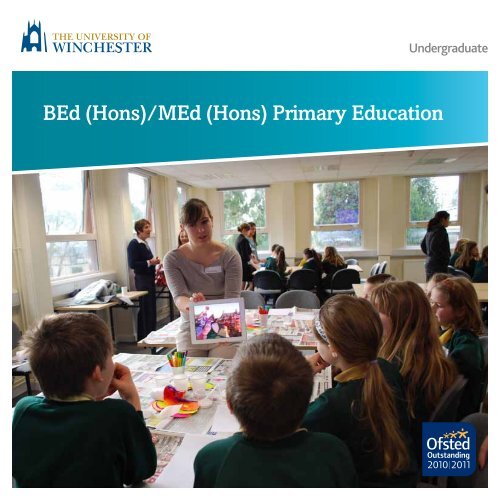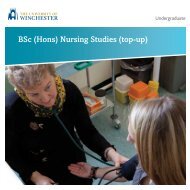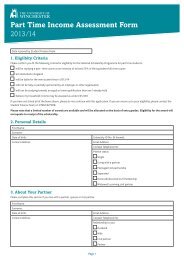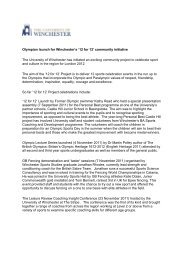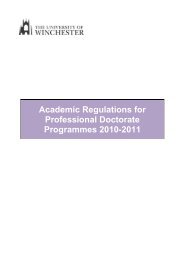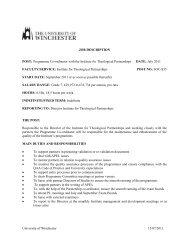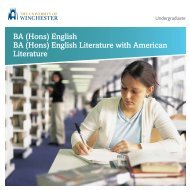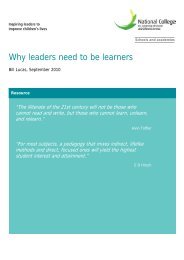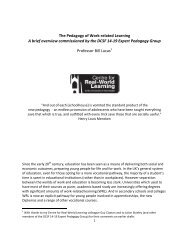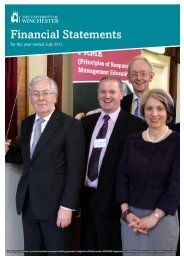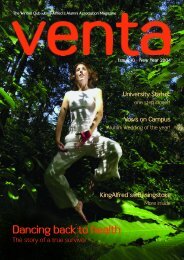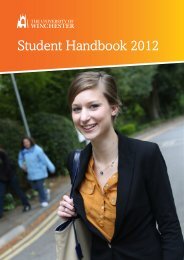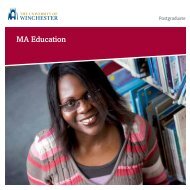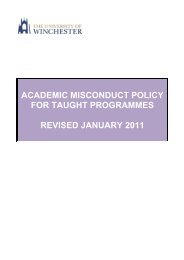BEd (Hons)/MEd (Hons) Primary Education - University of Winchester
BEd (Hons)/MEd (Hons) Primary Education - University of Winchester
BEd (Hons)/MEd (Hons) Primary Education - University of Winchester
Create successful ePaper yourself
Turn your PDF publications into a flip-book with our unique Google optimized e-Paper software.
<strong>BEd</strong> (<strong>Hons</strong>)/<strong>MEd</strong> (<strong>Hons</strong>) <strong>Primary</strong> <strong>Education</strong>Undergraduate
Why study at <strong>Winchester</strong>?There are many reasons to study at the <strong>University</strong><strong>of</strong> <strong>Winchester</strong> – but the one to consider mostis that you will become part <strong>of</strong> a safe andsupportive community.The <strong>University</strong> is located within walking distance<strong>of</strong> the city centre <strong>of</strong> <strong>Winchester</strong>, which is only onehour away from London by train. The campus islocated in a beautiful wooded setting overlookingthe South Downs.Our graduates have a strong track record <strong>of</strong>finding employment after leaving the <strong>University</strong>.There is a dedicated Careers Service to provideadvice and help you research career pathways andemployers. They also organise recruitment fairsand workshops on how to write CVs and performwell at interview.We have excellent facilities for learning andteaching that are continually being updated toenhance the student experience. There is a vibrantStudent Union, excellent sports facilities, amodern library and IT facilities across the campus.At the <strong>University</strong> <strong>of</strong> <strong>Winchester</strong> we aim to providecampus or <strong>University</strong> Managed Accommodationto all first year full-time undergraduates who hold<strong>Winchester</strong> as their firm choice. In addition, wealso endeavour to provide students from non-EUcountries and students with disabilities a roomon campus, not just for their first year, but for theduration <strong>of</strong> their course.The culture <strong>of</strong> the <strong>University</strong> is informal and theemphasis is on you unlocking your potential,developing a clear sense <strong>of</strong> direction andbecoming the best you can be in your chosencareer.2 www.winchester.ac.uk
<strong>BEd</strong> (<strong>Hons</strong>)/<strong>MEd</strong> (<strong>Hons</strong>) <strong>Primary</strong> <strong>Education</strong>FACT FILETeacher education is an exciting andchanging field <strong>of</strong> study, but the variety<strong>of</strong> courses and routes which cannow be taken to enter teaching canbe bewildering. This leaflet aims tosupport the decision-making processby outlining our unique and highlyrated undergraduate programme at the<strong>University</strong> <strong>of</strong> <strong>Winchester</strong>. It providessignposts for gathering informationabout other routes into teaching whichmay be more suitable.Our <strong>BEd</strong> (<strong>Hons</strong>)/<strong>MEd</strong> (<strong>Hons</strong>) <strong>Primary</strong><strong>Education</strong> with recommendation <strong>of</strong>Qualified Teacher Status (QTS) builds uponour excellent practice and reputation andmaintains the high quality content which hasbeen consistently recognised in our provision.<strong>BEd</strong>/<strong>MEd</strong> <strong>Primary</strong> <strong>Education</strong> is anundergraduate programme leading toQualified Teacher Status and is located inthe Faculty <strong>of</strong> <strong>Education</strong>, Health and SocialCare. The range <strong>of</strong> programmes within theFaculty includes both undergraduate andpostgraduate Initial Teacher <strong>Education</strong>(ITE), <strong>Education</strong> Studies and courses atDiploma and Master’s degree level incontinuing pr<strong>of</strong>essional developmentfor teachers. The Faculty is a centre forresearch and innovation in the field <strong>of</strong>education.The fast pace <strong>of</strong> change in education atboth primary and higher education levelshas led our dynamic and forward-thinkingteam to develop an innovative programme<strong>of</strong> undergraduate study. This programme,whilst ensuring compliance with thelatest requirements <strong>of</strong> the Departmentfor <strong>Education</strong>, aims to produce criticallyreflective practitioners able to understandthe complexities and tensions in providingeducation for the twenty-first century.Thus the <strong>University</strong>-based programmeis designed both to support knowledgeand practical competences and providechallenges which develop values andunderstanding. We give prominence to ascholarly approach and a spirit <strong>of</strong> enquirywhich will endure beyond graduation toensure lifelong learning and personal andpr<strong>of</strong>essional growth. This is reflected andrealised in the diverse pr<strong>of</strong>essional andresearch activities <strong>of</strong> the teaching staffwho contribute to the programme.Through a range <strong>of</strong> stimulating andprogressively challenging learningexperiences, the <strong>BEd</strong> (<strong>Hons</strong>) <strong>Primary</strong><strong>Education</strong>/<strong>MEd</strong> (<strong>Hons</strong>) <strong>Primary</strong> <strong>Education</strong>Degree Duration: 3 or 4 years full-timeUCAS Codes:X120 3 years <strong>BEd</strong> (<strong>Hons</strong>)X122 4 years <strong>BEd</strong> (<strong>Hons</strong>)X121 4 years <strong>MEd</strong> (<strong>Hons</strong>)The 4 year <strong>MEd</strong> route allows studentsto further enhance and enrich theirpr<strong>of</strong>essional practice and to obtainMaster’s creditsThe university <strong>of</strong>fers a three and fouryear route to QTSEntry requirements and typical<strong>of</strong>fer: 300-340 points*. GCSE gradeA*-C passes or equivalent in English,mathematics and a scienceAdditional entry requirements:Disclosure and Barring Service (DBS)clearance check (formerly known asCRB) required when you accept the <strong>of</strong>fer<strong>of</strong> a place on the courseMedical ‘Fitness to Teach’, which isassessed by an Occupational HealthAdvisorCompletion <strong>of</strong> pre-entry Pr<strong>of</strong>essionalSkills Tests as required by theDepartment <strong>of</strong> <strong>Education</strong>Selection process: Potentially suitableapplicants are required to attend anindividual interview, to make a briefpresentation on an area <strong>of</strong> the NationalCurriculum in a group situation, and tocomplete a short written task.*Entry requirements correct at time <strong>of</strong>printing. For the most up-to-date entryrequirements please go towww.winchester.ac.ukwww.winchester.ac.uk1
<strong>BEd</strong> (<strong>Hons</strong>)/<strong>MEd</strong> (<strong>Hons</strong>) <strong>Primary</strong> <strong>Education</strong>and respectful learning experiences. Assuch, the programme vision is to nurtureintending teachers with clear and informedpr<strong>of</strong>essional identities who are:• Reflective practitioners whoacknowledge the complexity <strong>of</strong> their role• Confident and creative thinkers who areat the forefront <strong>of</strong> innovative practice• Open-minded, curious and willing toengage with different perspectives• Motivated, enthusiastic and responsiveto the needs <strong>of</strong> children• Knowledgeable pr<strong>of</strong>essionals equippedwith skills to make informed decisionswith QTS programme at the <strong>University</strong><strong>of</strong> <strong>Winchester</strong> educates and prepareshigh quality primary school practitioners.This preparation and education is acharacteristic strength <strong>of</strong> undergraduateteacher education at the <strong>University</strong><strong>of</strong> <strong>Winchester</strong>, where students buildtowards the pr<strong>of</strong>essional expectations andrequirements <strong>of</strong> classroom practice, whilstengaged in the routines and practice <strong>of</strong>academic study.The programme supports the development<strong>of</strong> individual practitioners, withina community <strong>of</strong> learning, who arecommitted to the education <strong>of</strong> youngchildren. This commitment is evidentin students during the pre-programmeapplication and interview process, and isreflected in the values which underpin ourprovision. The values support and promoteteaching practices which encouragepersonalised learning and embrace rightful• Lifelong learners who work flexiblywithin pr<strong>of</strong>essional communitiesWe are committed to encouraging studentson to the programme with a wide range <strong>of</strong>previous experience, from school leaversto mature students with considerableexperience both within education andother fields. We make the starting point forthe programme the individual student aslearner and future teacher.2 www.winchester.ac.uk
<strong>BEd</strong> (<strong>Hons</strong>)/<strong>MEd</strong> (<strong>Hons</strong>) <strong>Primary</strong> <strong>Education</strong>Our success is dependent on strongand effective relationships with ourPartnership schools. Headteachersand teachers are involved in planning,teaching and evaluating the programme,as well as interviewing applicants.This collaboration with educationpr<strong>of</strong>essionals guarantees the quality<strong>of</strong> provision and ensures we interpretDepartment for <strong>Education</strong> requirementsconsistently whilst meeting the needs <strong>of</strong>schools.Teacher education has been at theforefront <strong>of</strong> our learning provision at the<strong>University</strong> <strong>of</strong> <strong>Winchester</strong> for many years.The institution began training teachersin 1840 and we have an excellentreputation for nurturing competentpr<strong>of</strong>essionals. We are a provider <strong>of</strong>one <strong>of</strong> the largest programmes forprimary teacher training in the countryand in recent years a high proportion<strong>of</strong> the newly-qualified teachers inHampshire and the local region arefrom this <strong>University</strong>. A significantstrength is the continuing development<strong>of</strong> the programmes we <strong>of</strong>fer to ensureour graduates are at the forefront <strong>of</strong>developments in education as they moveinto their first teaching posts.Our programme is unique in <strong>of</strong>feringa common Year 1 and Year 2 <strong>of</strong> study,with students then selecting to moveon to either the three or four year route.Students select a specialism to follow fromYear 2. This allows us to cater for the range<strong>of</strong> previous experience and achievements<strong>of</strong> students entering and progressingthrough the programme. The programmecovers Pr<strong>of</strong>essional Theory, Practiceand Research, Curriculum Studies andSpecialisms; this breadth ensures theprogramme is demanding, thorough andalways up-to-date.What qualifications do I need?We welcome students with a range <strong>of</strong>qualifications and previous experienceonto the programme. To enter any teachertraining programme, applicants needGCSE grade A*-C passes or equivalentin English, Mathematics and a Sciencesubject. Candidates will need to completethe Department for <strong>Education</strong> Pr<strong>of</strong>essionalSkills Tests in Literacy and Numeracyprior to entry. In addition, applicants arerequired to complete successfully one <strong>of</strong>the following pathways (or recognisedequivalent) to levels specified on ourwebsite:• A/AS/VCE level• International Baccalaureate• BTEC• CACHE diploma• Access courseApplicants are advised <strong>of</strong> the need todemonstrate previous relevant workexperience in a primary or nursery schoolamounting to a minimum <strong>of</strong> two weekswithin the last two years to ensure arealistic understanding <strong>of</strong> the role <strong>of</strong> theprimary teacher today. Applicants whowould otherwise rely on memories <strong>of</strong> theirown primary education, or <strong>of</strong> experiencein school some time ago, will find thewww.winchester.ac.uk3
<strong>BEd</strong> (<strong>Hons</strong>)/<strong>MEd</strong> (<strong>Hons</strong>) <strong>Primary</strong> <strong>Education</strong>realities <strong>of</strong> the contemporary primaryschool surprising and should be preparedfor interview. For those <strong>of</strong>fered a place onthis programme there is the expectationthat a further self-directed two weekplacement will be undertaken in a schoolprior to commencing this programme inmid-September.Programme contentThe programme aims are addressedthrough three key interdisciplinary themes,chosen for their relevance to the graduateprimary teacher:• Identity• Perspectives• RelationshipsThe three inter-related themes providea unifying structure which links thevarious <strong>University</strong>-based strands witheach other and with school-based work.Together they <strong>of</strong>fer a pr<strong>of</strong>essional andacademic programme which combinesthe development <strong>of</strong> effective and skilledpractice with the analytical awareness<strong>of</strong> self and culture which is centralto the development <strong>of</strong> the graduatepractitioner.Length <strong>of</strong> programmeStudents can elect to complete theprogramme in three years or four years,achieving recommendation for QTS at theend their programme. Year 1 and Year 2 <strong>of</strong>the <strong>BEd</strong> and <strong>MEd</strong> routes are the same, andtherefore students can change between thethree/four year route, and the <strong>MEd</strong> route,up until the end <strong>of</strong> Year 2.Four year <strong>MEd</strong> students have additionalopportunities to enhance and enrich theiracademic and pr<strong>of</strong>essional practice to tailortheir expertise and obtain Master’s credits(up to 120 credits). In an increasinglyMaster’s led pr<strong>of</strong>ession this is anexciting opportunity to undertake higherlevel study, research and pr<strong>of</strong>essionaldevelopment before the Newly QualifiedTeacher (NQT) year.Choice <strong>of</strong> specialist subjectSubject specialisms allow study <strong>of</strong> asubject in greater depth at an appropriateacademic level and enable futurecontributions to the development <strong>of</strong> thesubject either as a member <strong>of</strong> teachingstaff or as a subject leader within an earlyyears setting or primary school. Studentsconfirm their choice <strong>of</strong> specialism at theend <strong>of</strong> Year 1 after experiencing tastercourses in all subjects. This programme<strong>of</strong>fers a wide choice <strong>of</strong> specialisms,currently the subjects available are:Art, Drama, Early Years, English, French,Geography, History, ICT, Mathematics,Music, Physical <strong>Education</strong>, Religious<strong>Education</strong>, Science and Special <strong>Education</strong>alNeeds.Teaching and learningThe range <strong>of</strong> strategies for teaching andlearning includes:• Lectures• Seminars, both tutor and student-led• Workshops• School and <strong>University</strong>-based directedtasks• Computer assisted learning, including aLearning Network• Student self-study4 www.winchester.ac.uk
<strong>BEd</strong> (<strong>Hons</strong>)/<strong>MEd</strong> (<strong>Hons</strong>) <strong>Primary</strong> <strong>Education</strong>AssessmentAssessment is mainly through assignmentscompleted during modules includingwritten assignments, seminars,presentations, displays, resource designand review, portfolios, web-basedmaterials and school placements.Programme overviewThe programme provides richand varied learning experienceswhich equip students with knowledge andskills to respond to the needs <strong>of</strong> childrenin educational settings. Students becomeconfident practitioners with a secureunderstanding <strong>of</strong> factors affecting learningand teaching.Students are prepared to teach primaryschool children (5-11 years). Early YearsSpecial Subject students are furtherprepared for the 3-5 years age range.They follow a common programme whichincludes both theoretical and practicalissues relating to teaching in primaryschools. The aims <strong>of</strong> the programme areachieved through four organisationalstrands: Pr<strong>of</strong>essional Theory, Practice andResearch; Curriculum Studies; SpecialistSubject and Work Placement and SchoolExperience.Pr<strong>of</strong>essional Theory, Practice andResearchThis aspect <strong>of</strong> the programme encouragesstudents to consider theoreticalunderpinnings <strong>of</strong> education and how theyimpact on children’s learning and teachers’practice.Curriculum StudiesStudents explore the range <strong>of</strong> subjectstaught in primary schools and the discreteand inter-related aspects <strong>of</strong> a broad andbalanced curriculum. Students selectoptions to enhance their knowledgeand understanding <strong>of</strong> areas <strong>of</strong> learning.www.winchester.ac.uk 5
<strong>BEd</strong> (<strong>Hons</strong>)/<strong>MEd</strong> (<strong>Hons</strong>) <strong>Primary</strong> <strong>Education</strong>Options include National Curriculumsubjects and, more broadly, areas such asLearning Outside the Classroom, Additional<strong>Education</strong>al Needs, Early Years, Creativityand Pr<strong>of</strong>essional Partnerships. This abilityto personalise a pr<strong>of</strong>essional portfolio inboth breadth and depth enables studentsto meet their own needs and follow areas<strong>of</strong> particular interest.Specialist SubjectThe programme enables all students toexplore one subject in more depth, fromYear 2, with an aspiration to promotethis subject as future curriculum leaders.Specialisms reflect the range <strong>of</strong> subjectswithin the primary curriculum and specificareas such as Early Years and Special<strong>Education</strong>al Needs.The programme’s approach is underpinnedby consideration <strong>of</strong> the United NationsConvention on the Rights <strong>of</strong> the Child.Students are nurtured to reflect on theireducational values as they develop intoenthusiastic, creative and respectfuleducators, equipped to engage with wideraspects <strong>of</strong> schooling such as social andemotional development, citizenship andsustainability.Work Placement and SchoolExperienceStudents are encouraged to work in arange <strong>of</strong> schools and educational settings.<strong>University</strong>-based activities are linked toschool based activity and students visitschools for a range <strong>of</strong> activities. Each yearthey are allocated a School Experienceplacement, and at each stage students canexpress preferences regarding geographicalarea, age range and particular interestssuch as gaining experience in a schoolwhich caters for children with Special<strong>Education</strong>al Needs. We have strongpartnership links with over 700 schoolsacross the southern region. We currentlyalso <strong>of</strong>fer opportunities to work in London,the Isle <strong>of</strong> Wight and the Channel Islandsthrough links with local authorities.School-based placements, organised by the<strong>University</strong>, are supported by <strong>University</strong> andschool-based staff to ensure the growthand development <strong>of</strong> skilled practitioners.Placements are developmental andprogressive ranging from short visits tosustained placements. Students are alsoencouraged to arrange additional selfdirectedplacements in settings such asmuseums, galleries and residential centresto augment their range <strong>of</strong> experience, andoverseas placements are possible.The final school experience involvestaking full responsibility for an extendedplacement (10 weeks approximately),liaising with and reporting to parents andother agencies involved in the school.On this practice students demonstratethey can meet all the Qualified TeacherStatus standards by assessing, planningand teaching the whole class for a goodproportion <strong>of</strong> the time from early inthe practice. Students are expected tocontribute to any additional expensesincurred when working in schools.Teaching teamThe teaching team has a wide range<strong>of</strong> experience in the field <strong>of</strong> educationincluding teaching in schools and inspectionand advisory work. Tutors contribute tothe development <strong>of</strong> policy and practicein education through consultancy andwork with, for example, the Qualificationand Curriculum Authority, the TrainingAgency and the <strong>University</strong> Council for the<strong>Education</strong> <strong>of</strong> Teachers, as well as a range <strong>of</strong>subject pr<strong>of</strong>essional associations, such asthe Association for Science <strong>Education</strong> andthe United Kingdom Literacy Association.All members <strong>of</strong> the team are activelyinvolved in research and pr<strong>of</strong>essionaldevelopment activities including funded6 www.winchester.ac.uk
<strong>BEd</strong> (<strong>Hons</strong>)/<strong>MEd</strong> (<strong>Hons</strong>) <strong>Primary</strong> <strong>Education</strong>research and innovation projects. The teamis complemented by a number <strong>of</strong> highlyexperienced practitioners who contribute totaught sessions in the <strong>University</strong> and <strong>of</strong>fersupport to students on school experience asLink Tutors.Assessing the <strong>University</strong> <strong>of</strong><strong>Winchester</strong>The provision <strong>of</strong> primary teacher educationwas last assessed by Ofsted in November2010. The inspection confirmed theprovision as outstanding. The reporthighlights:• the high quality <strong>of</strong> training, whichleads to the outstanding progress andachievement <strong>of</strong> trainees• the coherence <strong>of</strong> central and schoolbased training• the highly effective and individualisedsupport for trainees• training in equalities and diversity, whichresults in trainees’ impressive levels <strong>of</strong>confidence and understanding abouthow to be effective teachers in a diversesociety;• the tutorial system, which providesexemplary support for individual traineesand highly effective monitoring <strong>of</strong> thetraining and provision• the opportunities that specialistplacements and self-directed daysprovide for trainees to pursue their ownspecialist pr<strong>of</strong>essional interests• the content and structure <strong>of</strong> thepr<strong>of</strong>essional studies modules, whichensures that trainees have a clearunderstanding <strong>of</strong> pr<strong>of</strong>essional issues• the flexibility <strong>of</strong> the training programme,which encourages suitable applicantsfrom a wide range <strong>of</strong> circumstances toapply.Career opportunities<strong>Winchester</strong> Initial Teacher <strong>Education</strong>graduates have a high employment rate; itis consistently well over 90 per cent.Most students pursue their career inteaching, although the programmeprovides a range <strong>of</strong> transferable skills.Ofsted consider “the overall effectiveness<strong>of</strong> the provider is outstanding becausethe training, assessment and quality <strong>of</strong>the provision across the partnership are<strong>of</strong> the highest quality, enabling traineeson all programmes to make excellentprogress and to achieve consistentlygood or outstanding results.” Partnershipteachers contribute to the programmefrom recruitment to preparation for theNewly Qualified Teacher year to ensurethe <strong>University</strong> appropriately supportsongoing teacher development. Many localHeadteachers and Deputy Headteachersare <strong>Winchester</strong> graduates.A programme <strong>of</strong> preparation for applyingfor teaching posts is held annually for finalyear students. If, in rare instances, studentsrealise that teaching is not their long-termvocation, they can complete a degreewithout QTS and advice and support isavailable to find an allied or alternativecareer. Indeed the <strong>BEd</strong>/<strong>MEd</strong> (<strong>Hons</strong>) <strong>Primary</strong><strong>Education</strong> prepares students with manywidely transferable skills.Contact us:Course Enquiries and ApplicationsTelephone: +44 (0)1962 827234Email: course.enquiries@winchester.ac.ukwww.winchester.ac.uk 7
8 www.winchester.ac.uk
Explore the <strong>Winchester</strong> experienceOpen Days are a great way to find out moreabout the course that you are interested in. It isalso an opportunity to explore the campus andmeet tutors and current students to discoverwhat studying at <strong>Winchester</strong> is all about.To find out when the next Open Day is visitwww.winchester.ac.uk/opendays or contact theStudent Recruitment team.If you miss any <strong>of</strong> the Open Days or areunavailable to attend – you can arrange aCampus Tour instead by contacting the StudentRecruitment team.Student RecruitmentTelephone: +44 (0) 1962 827089Email: opendays@winchester.ac.ukAt the event, academics from all <strong>of</strong> ourprogrammes will be around campus givingsessions about your subject <strong>of</strong> interest. Each<strong>of</strong> the sessions will include an overview <strong>of</strong> thecourse, entry requirements, the applicationprocess and an opportunity to ask any questionsyou might have.Student Union representatives will also beavailable so you can find out more about<strong>Winchester</strong>’s sports clubs, societies andcommunity involvement.As part <strong>of</strong> the campus tour you will see the halls<strong>of</strong> residence and the West Downs Student Villageand find out more about living in <strong>Winchester</strong>.You will also be told about the student supportservices and scholarships and bursaries that areon <strong>of</strong>fer.
Finding out more...Course Enquiries and ApplicationsTelephone: +44 (0)1962 827234Email: course.enquiries@winchester.ac.ukThe <strong>University</strong> <strong>of</strong> <strong>Winchester</strong><strong>Winchester</strong>Hampshire S022 4NRwww.winchester.ac.uk03975/8/2013a large print version <strong>of</strong> thisbooklet is available on request


